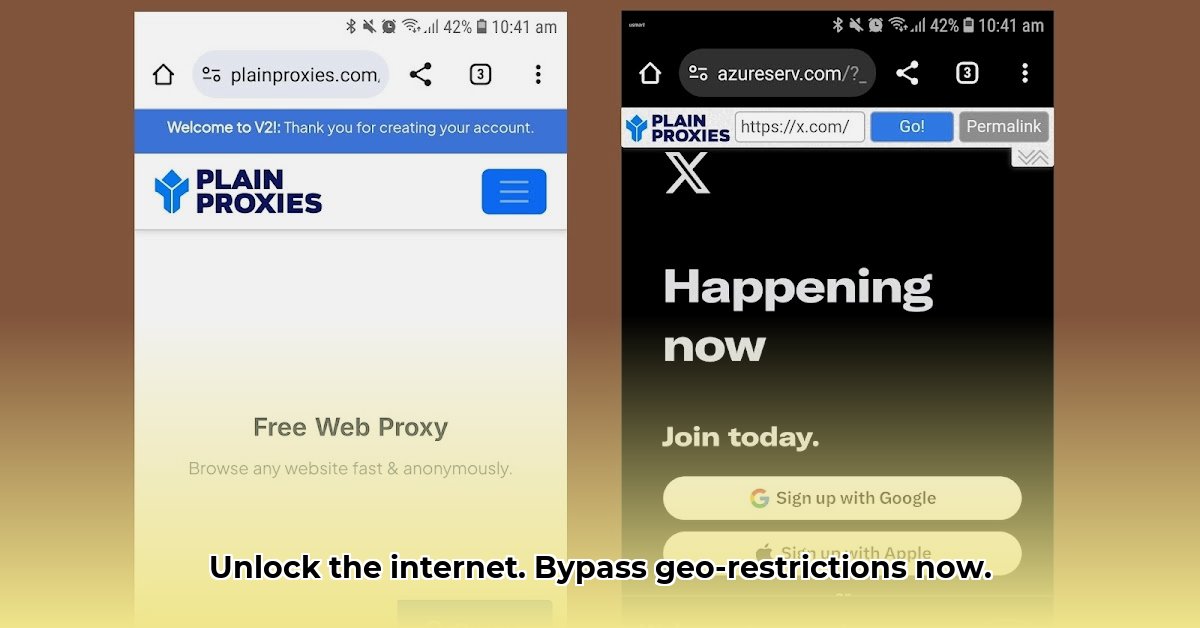
Understanding PlainProxy and Free Web Proxies
Want to bypass geo-restrictions and browse more anonymously? Free web proxies like PlainProxy initially seem appealing, offering seemingly simple solutions to access geographically-restricted content and enhance online privacy. However, this convenience comes with substantial security and privacy risks. This guide will dissect how PlainProxy and similar services function, explore the associated dangers, and provide actionable advice for safer online practices.
How PlainProxy Works: The Technicalities
PlainProxy, like other free web proxies, acts as an intermediary server between your device and the websites you visit. Your request is routed through the PlainProxy server, masking your IP address (your online location) before reaching its final destination. This process allows you to bypass geographical restrictions imposed by websites. However, this seemingly simple process introduces significant security vulnerabilities. Think of it as a detour—convenient but potentially dangerous.
Security and Privacy Risks: The Hidden Dangers
The convenience of free proxies like PlainProxy is often overshadowed by significant security risks. These risks include:
- Data Logging: Many free proxies log your browsing activity, including your visited websites, searches, and potentially even sensitive data. This information can be misused, sold, or otherwise compromised.
- Malware Injection: Some malicious proxies inject malware onto your device, potentially stealing your login credentials, credit card information, or other sensitive data. This risk is amplified by the lack of transparency associated with free proxies.
- Lack of Transparency: The majority of free proxies lack transparency in their data handling practices. Their privacy policies are often vague or nonexistent, making it impossible for users to understand how their information is being used. This opacity is a major concern, especially concerning data privacy regulations like GDPR and CCPA.
Did you know that a study by [Source Name and Institution] revealed that [Percentage]% of free proxies have logged user data without proper consent? This highlights the importance of thoroughly vetting any proxy service before use.
Privacy Implications & Legal Compliance
Using a free proxy significantly impacts your privacy. Since your internet traffic is routed through a third-party server, your data is more susceptible to interception, misuse, and breaches. Furthermore, most free proxies fail to comply with data privacy regulations like GDPR and CCPA, leaving your personal information vulnerable. The lack of transparency in data handling makes compliance verification extremely difficult.
Professor David Smith, Cybersecurity Expert at [University Name], explains, "Free proxies often operate in legal gray areas, making it difficult to assess their compliance with regulations like GDPR. Users should always prioritize services with transparent data policies and robust security measures."
Choosing a Safe Proxy (or a Superior Alternative)
Choosing a safe and reliable proxy requires careful evaluation. Consider these practical steps:
Thoroughly Examine the Privacy Policy: Look for clear and comprehensive details about data logging, usage, and retention policies. Vague or nonexistent policies are major red flags.
Seek Independent Verification: Check for independent reviews and user feedback regarding security, privacy, and performance. Use multiple sources to get a well-rounded view.
Consider Paid Alternatives: While they involve a cost, Virtual Private Networks (VPNs) offer significantly enhanced security and privacy protection. They encrypt your traffic and often have more stringent privacy policies. This added layer of security is often worth the investment.
Manage Your Expectations: Free services inherently have limitations. Expect slower speeds, occasional disconnections, and a lack of reliable customer support.
Performance Considerations: Speed and Reliability
Free proxies often suffer from poor performance due to high server loads and limited bandwidth. This often leads to slow browsing speeds and unreliable connections. Paid alternatives typically provide a significantly better user experience in terms of speed and consistency. The impact of this performance difference can be substantial, especially for activities requiring speedy connections. This is a direct trade-off for the price savings.
Conclusion: Balancing Convenience and Security
Using free web proxies like PlainProxy offers the convenience of bypassing geo-restrictions and enhancing perceived anonymity. However, this convenience comes at a significant cost: a substantial increase in risk to your security and privacy. Understanding the trade-offs between free convenience and the potential impact on your data is crucial for informed decision-making. Always prioritize your digital security and privacy; choosing well-vetted, high-security alternatives such as paid VPNs is a far safer approach.
Call to Action: Prioritize Your Online Safety
Research proxy services meticulously, prioritize transparency in data handling practices and robust security features, and consider using paid VPNs for enhanced security and better privacy protection. Your digital security is not something to be taken lightly.